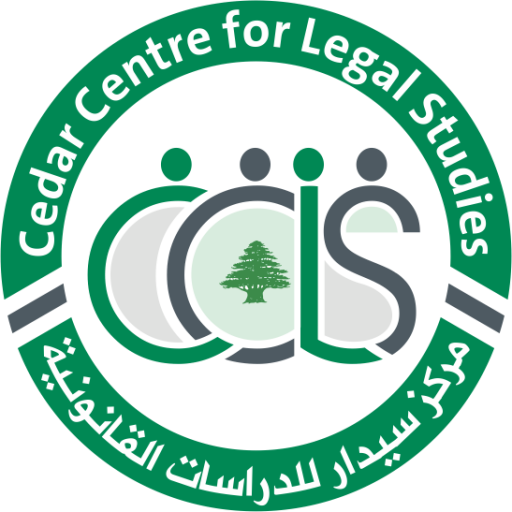Cedar Centre For Legal Studies
Case Title
The Cedar Rehabilitation Center Opens Its Doors: From the Wounds of Torture to Healing – Case X between Pain and Support
08/05/2025

08/05/2025
Background
In early 2025, the parents of Case VTC(X) turned to the Rehabilitation Center for Victims of Torture in Tripoli, operated by the Cedar Centre for Legal Studies (CCLS). Their son was in detention and reportedly subjected to acts of torture falling under the definition in Article 1 of Law No. 65/2017. While Article 1(c) of the Anti-Torture Law states that rehabilitation may be ordered by the court, no such judicial decision has been made in this case yet. Nonetheless, Cedar Centre provided holistic psychosocial and legal support to the family, recognizing that the absence of a court order should not be a barrier to urgently needed care.
“When we approached the Rehabilitation Center for Victims of Torture in Tripoli, affiliated with Cedar, our son was still in prison, enduring torture. His suffering was the main reason we sought support, as we too were experiencing profound psychological pain due to his detention and the abuse he endured,” said the parents
1. Intake and Psychosocial Support
Although the Anti-Torture Law does not guarantee automatic access to rehabilitation, Cedar Centre acted on the basis of international human rights standards—namely, the UN Convention Against Torture, which Lebanon has ratified—to provide the family with immediate mental health and psychosocial support.
A personalized care plan was developed after an intake assessment by Center’s social worker and psychologist.
“As the parents of Case Number VTC(X), we participated in several psychosocial support sessions, and we received a high level of care and professionalism. The Center has a fully qualified, integrated team that truly understands what families like ours go through,” the parents shared.
2. Follow-Up and Family Therapy
The family received continuous follow-up care through individual and family sessions. After visiting their son in prison and witnessing the effects of torture firsthand, the parents experienced renewed trauma, for which the Center provided therapeutic interventions.
The father shared:
“I never believed in the effectiveness of psychological therapy, nor was I ever convinced of its value. But when the center welcomed me with genuine care and support, and gave me the opportunity to attend several therapy sessions, I began to truly understand its importance—especially for us, the parents of torture victims. We, too, carry the weight of this pain, and it’s undeniable that we are indirect victims of what our have suffered.”
The mother added:
“This center became a safe haven for both me and my husband. It helped us rebuild ourselves psychologically and socially, and provided us with essential techniques, exercises, and tools that now enable us to support our son emotionally at home. Our role is just as vital as that of the center in helping our son recover from the trauma of torture and imprisonment. Today, we feel more at peace, stronger, and better equipped to face our reality with hope. We are now focused on transforming our suffering and mental exhaustion into hope for a brighter future—for our son, and for ourselves.”
3. Legal Assistance
Even though the law does not compel authorities to provide rehabilitation without a court order, the Cedar Centre supported the family legally throughout the process and pushed for their son’s release.
“The legal team helped us make sense of the court process and gave us confidence that we were not alone,” said the parents.
4. Legal Timeline – Case VTC(X)
20 February 2025: Parents met with Me. Mohamad Sablouh, head of CCLS Legal Support Program. Case was accepted.
10 March 2025: Legal team began preparing a release request.
17 March 2025: First court session (postponed).
14 April 2025: Court ordered the son’s release.
5. Continued Support after Release
The Center maintained support after the son’s release. Though the Anti-Torture Law does not guarantee rehabilitation unless ordered by the court, Cedar Centre recognizes the moral and humanitarian imperative of supporting survivors and their families.
“we continue to benefit from the services of the Rehabilitation Center for Victims of Torture in Tripoli, operated by Cedar Centre for legal studies, and from its continued support throughout our healing journey.”
Conclusion
This case highlights both the limitations and the potential of Lebanon’s Anti-Torture Law No. 65/2017 in practice. Article 1 of the law defines torture broadly and affirms the prohibition of such acts under any circumstances. It also acknowledges the possibility of rehabilitation for victims, but only at the court’s discretion as stated in Article 1(c). In this case, no court decision has been issued yet to grant rehabilitation, reflecting a wider trend in which the judiciary rarely invokes this clause.
Despite that gap, Cedar Centre for Legal Studies provided comprehensive legal and psychosocial support, recognizing that access to rehabilitation and justice should not be conditional. The legal team supported the family throughout the legal process until their son’s release.
By offering this support even in the absence of a court order, the Centre fulfilled a critical protection role and upheld the spirit of international treaties ratified by Lebanon, including the UN Convention Against Torture, which affirms the victim’s right to redress, including rehabilitation.
This case demonstrates that until Lebanese courts consistently apply Article 1(c), civil society organizations must continue to fill the gap; ensuring that the right to rehabilitation is not merely theoretical but realized in practice.
